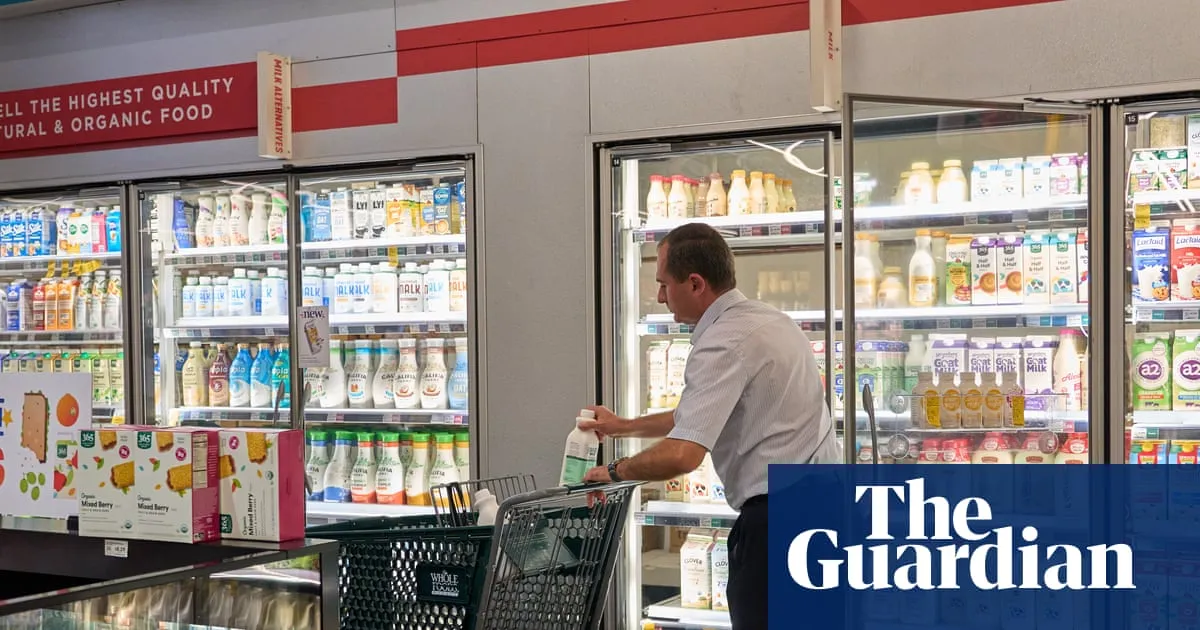
As a mother of two, Paige Harris has experienced a significant shift in her grocery shopping habits. "Items that I have bought regularly have gone up in price steadily," she remarked. "From hair dye to baby formula, our grocery list has gotten smaller while our budget has had to increase. Meats like steak are a no-go for our household." At 38, Harris resides in Stella, North Carolina, where she works as a teacher's assistant. She is one of nearly 40 individuals who shared their experiences with the Guardian regarding the increasing cost of goods following the announcement of tariffs by Donald Trump six months ago.
On Thursday, a study released by S&P Global indicated that companies are expected to incur at least $1.2 trillion more in expenses by 2025 than previously predicted. Alarmingly, the burden of these costs is shifting to American consumers. Research shows that two-thirds of this "expense shock," amounting to over $900 billion, will be absorbed by households across the nation. A recent estimate from the Yale Budget Lab suggests that tariffs could cost American families nearly $2,400 more annually.
Harris expressed her discontent with the tariff's impact on her daily life, which starkly contradicts the Trump administration's promises to "cut prices and make living affordable for everyone." She stated, "You see prices soaring. It has become very clear that this administration did not and does not care about the everyday lives of Americans."
Many Americans have reported drastic changes to their weekly budgets since the introduction of the tariffs. Jean Meadows, a 74-year-old retiree from Huntsville, Alabama, shared, "Prices are way too high. I mostly shop at Costco and buy as little as possible anywhere else. I can’t imagine that stores haven’t noticed the change. I think people are really afraid of what is coming." This sentiment of apprehension was echoed in a recent poll conducted exclusively for the Guardian, where respondents identified tariffs as the second biggest threat to the economy.
Myron Peeler, another retiree and caregiver from Florida, noted, "The bread I buy has doubled in price within a year. We live on a fixed income that doesn’t keep up with inflation." He considers himself fortunate that his house and car are paid off, but acknowledges the growing financial strain on households.
Despite the outcry from consumers, President Trump shows little intention of reversing his tariff policy. The administration maintains that these tariffs will reinvigorate American manufacturing and increase revenue from trade partners. Recently, Trump escalated tensions with China, threatening a 100% tariff on Chinese imports as soon as November. This threat came after China decided to restrict exports of rare earth minerals, which are essential for various everyday items, leading Trump to label their actions as "very hostile."
In an interview with Fox News, Trump admitted that the proposed tariff hike was "not sustainable," yet he claimed he was left with "little choice." Currently, average US tariffs on Chinese exports are around 58%, according to the Peterson Institute for Economics, a figure that is already impacting American consumers.
Consumers like Michele from north-eastern Pennsylvania are feeling the pinch. "We need to buy new tires for a car, and can’t, because affordable tires are no longer in stock and we can’t afford $250 a tire," she lamented. Others have voiced similar frustrations about availability, describing their local stores as having "empty shelves and higher prices." Natalie, a semi-retired woman from New Hampshire, remarked that she hasn't seen certain pantry staples in months, stating, "The store shelves have become more and more bare … instead of multiple choices, there may only be one or two, and name brands are being replaced by store brands."
At 55, Natalie has experienced price increases on nearly all the items she purchases regularly, with cat food prices soaring anywhere from 25% to double. "One wet food my cats like went from $1.79 to $2.49 per can," she shared, exemplifying the financial strain many families are currently facing.
The new normal for many Americans, including Minnie, a food writer in Portland, Oregon, is not just about rising grocery prices. "I don’t shop for non-essentials. No fall shopping trips for a new sweater or jeans. And we’ll make all our Christmas presents this year," said the 55-year-old. "We used to dine out once a week. Now we never eat out. Even fast-casual is insanely pricey. Everything is twice what it used to cost, and we’re very afraid of what’s next, financially speaking."
While the current US inflation rate stands at 2.9%—a significant decrease from the spikes during the Covid era—the impact of tariffs continues to burden American wallets. Richard Ulmer, 81, who has lived in Florida for 35 years, described this year as "the worst from a financial standpoint," noting that everything from groceries to utility bills has become more expensive.
For Cassie, a 25-year-old consultant in Siler City, North Carolina, costs have increased sharply compared to the "gradual price increases" experienced during the pandemic's early years. With a strict $65 weekly budget for groceries, she now finds herself visiting multiple stores to find the best prices. "During the summer months and the Mexico/Latin America tariff announcement, Walmart and other stores in the area ran out of bananas for around two weeks. No one could get bananas in my area," she explained.
The collective experiences of these Americans illustrate the profound impact of tariffs on everyday life, prompting concerns about the future of household budgets across the nation.